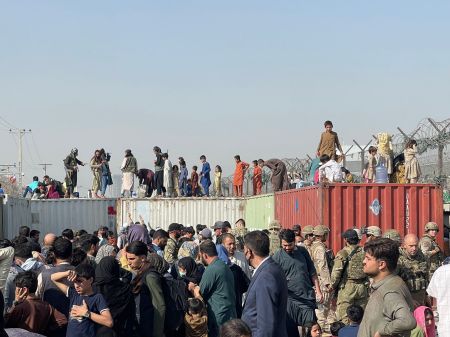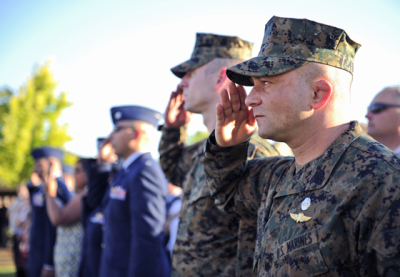Retired Marine recalls ‘divine miracle' in Afghanistan evacuation effort that saved 17,000

Aziz served as an interpreter for retired Force Recon Marine Chad Robichaux during his eight deployments to Afghanistan, saving the veteran's life many times. After President Joe Biden announced the United States would withdraw from Afghanistan in 2021, Robichaux was determined to repay the debt and rescue the man he considered family.
Robichaux's new book, Saving Aziz: How the Mission to Help One Became a Calling to Rescue Thousands from the Taliban, recounts the operation to rescue Aziz. The mission to save his interpreter eventually led to the evacuation of 17,000 vulnerable American citizens, Afghan allies, orphans and persecuted Christians left stranded in the central Asian after the U.S. withdrawal.

In an interview with The Christian Post, Robichaux said he had several concerns as a military strategist after Biden announced a complete withdrawal from Afghanistan in April 2021, which was completed in August 2021.
The veteran said that he thought it was a "mistake" to take the U.S. presence out of "the most strategic place in the globe between Iraq, Iran, Russia and China." He noted that the U.S. keeps troops stationed in Japan, Germany and South Korea, far more than the troops still stationed in Afghanistan, to "keep the world safe and keep us out of wars."
One of Robichaux's greatest concerns was that Aziz and his family would be left behind and targeted by the Taliban.
Before the withdrawal, Aziz had already tried for six years to leave Afghanistan through the special immigrant process. But according to Robichaux, the system is "broken," and Aziz's efforts were unsuccessful.
The retired Marine felt called to get Aziz out. He assembled a team of 12 experienced special operations men who didn’t need many resources to operate.
Called the "Saving Our Allies" campaign, the rescue mission was launched through Robichaux's Mighty Oaks Foundation, an organization he founded to help combat veterans struggling with trauma. The team consisted of recon Marines, Navy SEALs, Green Berets and members of the CIA's paramilitary unit.
"And one of the guys said, 'Hey, it's great that you're going to save Aziz and his family,'" Robichaux recalled. "'But what about these other kids? What about other Americans and interpreters and their families?'"

The team felt God calling them to something bigger, to do something for "people who could not help themselves." After obeying God's call, Robichaux said that what he witnessed afterward is something he could only describe as a "divine miracle."
"Not only did we get Aziz and his wife and kids, we got 17,000 people," Robichaux continued.
The U.S. abandoned the Bagram Air Force Base in the withdrawal process and removed the military before evacuating civilians, American allies and billions of dollars worth of equipment.
In August 2021, following the withdrawal of the remaining U.S. troops, the Taliban retook Afghanistan, creating a major evacuation crisis.
"If you would have been on the ground and seen the chaos there, people are being trampled to death because 100,000 people are trying to swarm the airport and get out," Robichaux said.
Some people were so desperate that they resorted to throwing their babies over a wall that was 6 feet high in an attempt to toss them to safety, not knowing at the top of the wall was 20 feet of concertina wire. One of Robichaux's friends, whose name is Joe, counted six babies hung up in the wire on the wall who bled to death.
If Robichaux and his team were to enter that environment, they knew they would need to go outside the military-controlled airport to rescue people.
Something that helped with the rescue effort is that the joint chiefs allowed the team, an NGO civilian operation, to land an aircraft and conduct evacuations.
Within the same time period, the United Arab Emirates allowed Robichaux and the team to bring people without visas that couldn't leave the country to a humanitarian center in Abu Dhabi.
The United Arab Emirates also gave the group a C-17 plane to fly people out. And then, conservative commentator Glenn Beck, a friend of Robichaux's, raised $21 million on the radio to help the Afghan veteran charter planes.
All of these events happened within the span of three days, according to Robichaux, and are the reason for the operation's success.
With only three people in the 12-man team going outside of the airport at a time to evacuate people, the group saved 12,000 people within the first 10 days of the operation, moving them to the humanitarian center in Abu Dhabi.
Despite the terror attack outside of the Kabul Airport, which resulted in the deaths of 13 American servicemembers, Robichaux and his team remained on the ground for another two months to rescue people. Operating out of a place called Mazar-i-Sharif, the group managed to fly another 5,000 people out.
The team also stayed to help people stuck in the Panjshir Valley who needed to get to Tajikistan but could not travel there due to the mountainous terrain and dangerous river rapids.
Another obstacle was the Russian and Chinese military securing that border in addition to the Taliban.
"The best way we could continue to serve was to help provide vital information from the other side of the border," Robichaux said. "We drove about 12 hours to the border, and we spent 10 days on the river, and we did about 90 miles of border reconnaissance."
Any information the group gained from doing reconnaissance they passed on to NGOs attempting to evacuate people and commandos helping to move civilians across.
Years after the Afghanistan withdrawal, with the Taliban banning women from universities and reinstating laws requiring them to wear full face coverings, Robichaux thinks it's important to share the "truth" about what happened and what his team did to recover people.
"God calls us to be obedient," he said. "And I think it's a great story of challenging people to just do the right thing when the right thing needs to be done."
"So this is super important that we get this message out, share the book with people because, from a global security perspective, we can never allow this kind of thing to happen again."
Samantha Kamman is a reporter for The Christian Post. She can be reached at: samantha.kamman@christianpost.com. Follower her on Twitter: @Samantha_Kamman





















